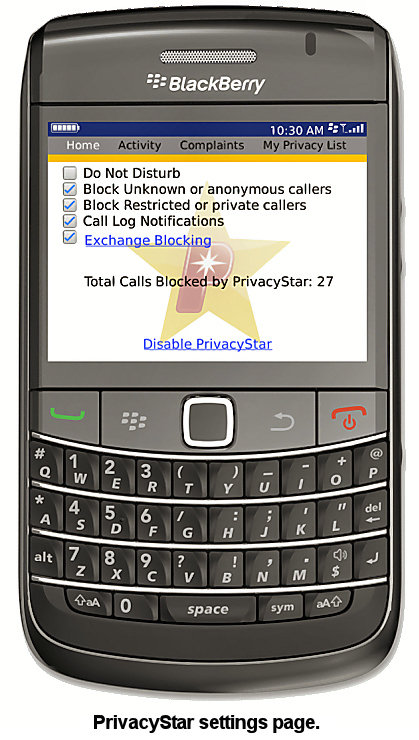Past Entry of Zippy's Telecom Blog
More Previous Columns
December 15, 2009
First Orion Unveils PrivacyStar, a Powerful Privacy Solution for BlackBerry Smartphones
First Orion is an innovative company that delivers interesting network-based privacy and preference services to wireline, wireless, Voice-over-IP (VoIP) users and smartphones. They’re based in Boston, Massachusetts and Conway, Arkansas. They bring to the fore a considerable intellectual property portfolio, as well as extensive global regulatory expertise and relationships. They’ve already established relationships with major North American and European telecommunications providers and major network service providers.
As for what they've just announced; First Orion’s new application, PrivacyStar “adds teeth” to the famous “Do Not Call” list and it gives you other options to control privacy on your phone.
The company lists the basic functions of the PrivacyStar application as follows:
PrivacyStar Features and Benefits:
• Simple to Use – After receiving an unwanted call, select the number from the call log to add to the Privacy List and that call will be blocked in the future.
• Report Potential Telemarketing Violations – Upon the user’s request, PrivacyStar captures detailed information about possible violations including date, time, number and identity. PrivacyStar easily allows users to provide this information to law enforcement authorities so they may take action.
• Caller Lookup – After receiving a call from a number that is not recognized (not in the contacts list), PrivacyStar Caller Lookup allows a user to identify unknown callers by name and take appropriate action, such as adding to the contacts list or Privacy List.
• Web Portal – Utilize the fully integrated personal web portal to manage blocked callers (including unblocking), provide additional details on violations and manage their Privacy Star account.
 To delve further into the workings and philosophy behind PrivacyStar, I talked with First Orion’s President, Jeff Stalnaker.
To delve further into the workings and philosophy behind PrivacyStar, I talked with First Orion’s President, Jeff Stalnaker.
Jeff Stalnaker: We started First Orion about three or four years ago, when we filed for various patent protections. Once it became clear that those were going to be issued in our favor, we launched the operation about 14 months ago. We are a company that is 100 percent committed to consumer privacy when it comes to the telephone. When I say that—and you’ll probably hear this a number of times during this interview—I am referring to privacy on your cell phone, your landline, or Voice-over-IP line—any phone, anytime, anywhere. As we review First Orion’s BlackBerry application—our first step into the marketplace—I’ll be talking about the future and our integration into various network providers. But today, I’ll be discussing our BlackBerry application. However, soon other versions of the application will be ready to be released, such as our Android application, the iPhone application, and the Microsoft Mobile application.
Richard Grigonis: How did you get involved in First Orion?
Jeff Stalnaker: I joined the company about 14 months ago when we officially launched the business and began operations. Prior to that I was with a company called Acxiom Corporation. They’re the largest integrated marketing services company in the United States, perhaps in the world. It was a publicly-traded company. I served as their chief financial officer for about four years. I’ve also worked running entities in the financial services industry for the past five years. So my background is really more in traditional finance, but for the past five years I’ve focused on running businesses.
I was persuaded into joining First Orion by our founder, Keith Fotta. Keith has an extensive career in the telecommunications industry, and was very involved in the launch of the U.S. National Do Not Call Registry some ten years ago. He spent a tremendous amount of time traveling across the nation in conjunction with the Federal Trade Commission, testifying in a number of states as well as participating in many roundtable discussions and planning session with the FTC. So he has considerable regulatory experience and the relationships there have been very important to our business, First Orion, as we launch it to give consumers ultimate control and privacy of their phone.
If you think about the telecom ecosystem, what we ultimately want to do is to give every consumer the ability to control their telephone. If people are violating your rights, if you’re on the Do Not Call list and people are still calling you, we want to make it very easy for you to be able to report those violators to the appropriate authorities, and we want you to have the ability to very easily block an intruding number from being able to call you again. Additionally, we want you to be able to easily identify who are calling your cell phone—or as in the case of our announcement, with the BlackBerry smartphone application. I don’t know about you, but I get a lot of calls on my cell phone from numbers that are not in my contact list, and I never know if I should answer or not, and if they are going to leave a message at some point. With our application, in real-time fashion, and with a simple keystroke, I can do a call lookup and identify the name of the caller, then take whatever action I wish to. I could add them to my contact list or I could block them from future calls.
Richard Grigonis: I imagine you’ve researched this market pretty thoroughly.
Jeff Stalnaker: In fact, a survey by Rutgers University indicates that there are over 165 million numbers registered in the U.S. alone, and yet an estimated 150 million telemarketing calls are made every day. An estimated 20 percent of these—or about 30 million calls—are Do Not Call violations. Less than 0.2 percent of these violations will ever be reported, often because the procedure is too time-consuming or onerous for individual users. That being the case, over 25,000 violations will have been committed before reaching the typical 50 complaint threshold for an enforcement agency to begin investigations of a company. This is also a dramatically growing issue with mobile phones. These are the kind of facts that have spurred us to develop PrivacyStar.
 When we talk about an ecosystem, it’s really a matter of just giving the user ultimate flexibility. For example, we’re are extraordinary happy and proud of the way we have integrated a personal web portal into our system. You can be anywhere in the world—as long as you have an Internet connection, you can log in to your personal web portal and examine the numbers that you have blocked, look at any complaints that you may have filed, or you can manually add a number. So you have an integrated, completely linked and synchronized web portal that is matched exactly with your BlackBerry device, and soon with other devices. If you happen to change something on your BlackBerry device—say, you now want to receive calls from a number that you previously blocked—within seconds that change will appear on your personal web portal too. Those are the value propositions that we bring to the marketplace for our userbase.
When we talk about an ecosystem, it’s really a matter of just giving the user ultimate flexibility. For example, we’re are extraordinary happy and proud of the way we have integrated a personal web portal into our system. You can be anywhere in the world—as long as you have an Internet connection, you can log in to your personal web portal and examine the numbers that you have blocked, look at any complaints that you may have filed, or you can manually add a number. So you have an integrated, completely linked and synchronized web portal that is matched exactly with your BlackBerry device, and soon with other devices. If you happen to change something on your BlackBerry device—say, you now want to receive calls from a number that you previously blocked—within seconds that change will appear on your personal web portal too. Those are the value propositions that we bring to the marketplace for our userbase.
Richard Grigonis: So the functions are accessible via a series of screens on the BlackBerry?
Jeff Stalnaker: In the case of the BlackBerry application now available, from the PrivacyStar home page you can select Look-up Number, Block Number, Access Complaint Information or Settings. The Setting option allows you to select various preferences such as blocking unknown or anonymous numbers and call log notification. You can invoke Do Not Disturb to silence the phone for all calls if you like, and you can easily block all unknown, anonymous, restricted and private callers so that no number is displayed on the BlackBerry. PrivacyStar tracks the number of calls that have been blocked, and if you display your Call Log, you can see call log notifications indicating that PrivacyStar has blocked one or more incoming calls. In fact, it’s from your Call Log that you select “Look-Up” to identify the name of the caller, and it’s also from your Call Log that you select to add to PrivacyStar the name of the caller and thereby block an offending number. So when PrivacyStar identifies the name of the caller, you have the option of immediately adding them directly to your contacts or you can add them to your Privacy List to block the number. There’s even an exchange blocking feature that enables you to block any numbers from any exchange you specify.
The “My Privacy List” displays the numbers that you currently have blocked. From this page you can also remove numbers previously added to the Privacy List.
And of course a big selling point is the fact that PrivacyStar can automatically capture all information needed to file a complaint to the government, including caller identity, date and time of the call, and makes available to enforcement authorities. PrivacyStar employs a proprietary rules engine—a sort of expert system—to capture and process the information necessary for the official complaints. There’s no fuss in doing it. When this page appears on the BlackBerry, the user also has the option to view and edit the complaint information—indeed, a subscriber to the service can also use the information themselves to file complaints or private legal claims against callers, if he or she so chooses.
Richard Grigonis: And as for the future?
Jeff Stalnaker: Our goal is the full integration of PrivacyStar into all service providers. Telephone carrier roll-out in the U.S. and internationally will commence in the first quarter of 2010. PrivacyStar will be available for users of wireline, mobile and VoIP phone services, and as I’ve said, you’ll be able to manage your privacy preferences for personal phones through a personal web portal.
Like any great product, PrivacyStar will evolve and take on additional features. Aside from being available via other smartphones and telephone carriers beginning early next year, we’re working on such exciting enhancements as fraud protection—the ability proactively block any numbers known to be associated with cases of fraud. Then there’s the matter of leveraging the technology found in the world of social networking, since those systems allow for the instant massive sharing of complaints and blocked numbers. On a similar but smaller scale, we can institute “family plans” whereby numbers blocked by one family member are quickly and automatically shared with the rest of the family.
Richard Grigonis: For anybody who has had to deal with telemarketers or rogue collection agencies, all of this sounds like the system should be quite popular.
Jeff Stalnaker: Fortunately, given our current feature set, 95 percent of households surveyed have expressed an interest in the PrivacyStar service. After examining various demographics in both the U.S. and Canada, we’ve found that 52 percent of households surveyed expressed a willingness to pay our preferred monthly subscription, which has a price point of $2.99 a month. The PrivacyStar application is free for the first 30 days and anyone can download it for free at www.PrivacyStar.com. Following the trial period, PrivacyStar is then available for $2.99 per month.
Richard Grigonis: It all looks and sounds good. Let’s see if we can put the bad guys on the defensive!
